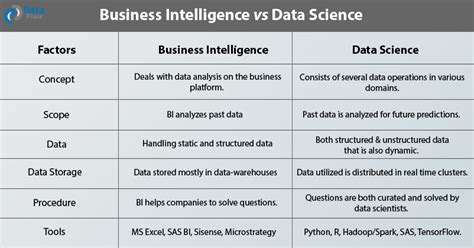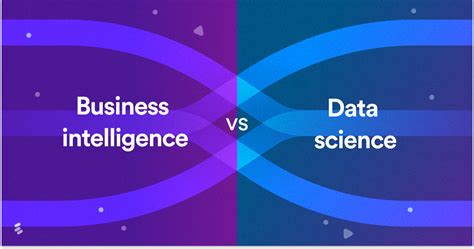The terms Business Intelligence (BI) and Data Science are often used interchangeably, but they have distinct meanings and applications in the context of data analysis. Business Intelligence refers to the process of analyzing and interpreting complex data to inform business decisions, whereas Data Science is a broader field that encompasses a range of activities, including data analysis, machine learning, and visualization, to extract insights and knowledge from data. In this article, we will delve into the differences between Business Intelligence and Data Science, exploring their definitions, methodologies, and applications.
Key Points
- Business Intelligence focuses on descriptive analytics, providing insights into past performance and current trends.
- Data Science encompasses a broader range of activities, including predictive and prescriptive analytics, to drive business innovation and growth.
- Business Intelligence typically relies on structured data, whereas Data Science can handle both structured and unstructured data.
- The primary goal of Business Intelligence is to support informed decision-making, whereas Data Science aims to drive business transformation and innovation.
- Business Intelligence and Data Science require different skill sets, with Business Intelligence professionals focusing on data analysis and reporting, and Data Science professionals possessing expertise in machine learning, programming, and data visualization.
Business Intelligence: Descriptive Analytics and Decision Support

Business Intelligence is a well-established field that has been around for decades. Its primary focus is on descriptive analytics, which involves analyzing historical data to identify trends, patterns, and insights that can inform business decisions. Business Intelligence professionals use various tools and techniques, such as data mining, reporting, and data visualization, to extract insights from data and present them in a meaningful way to stakeholders. The goal of Business Intelligence is to provide a clear understanding of past performance and current trends, enabling businesses to make informed decisions about future strategies and investments.
Characteristics of Business Intelligence
Some key characteristics of Business Intelligence include:
- Focus on descriptive analytics: Business Intelligence is primarily concerned with analyzing historical data to identify trends and patterns.
- Use of structured data: Business Intelligence typically relies on structured data, such as transactional data, customer data, and financial data.
- Emphasis on reporting and visualization: Business Intelligence professionals use various tools and techniques to create reports and visualizations that communicate insights and trends to stakeholders.
- Support for informed decision-making: The primary goal of Business Intelligence is to provide insights and information that support informed business decisions.
Data Science: Predictive and Prescriptive Analytics

Data Science is a more recent field that has emerged in response to the growing availability of large datasets and advances in computational power. Data Science encompasses a broader range of activities than Business Intelligence, including predictive and prescriptive analytics, machine learning, and data visualization. Data Science professionals use various techniques, such as regression analysis, decision trees, and neural networks, to extract insights and knowledge from data, and to drive business innovation and growth.
Characteristics of Data Science
Some key characteristics of Data Science include:
- Focus on predictive and prescriptive analytics: Data Science involves using statistical and machine learning techniques to predict future outcomes and prescribe actions.
- Use of both structured and unstructured data: Data Science can handle both structured data, such as transactional data, and unstructured data, such as text and images.
- Emphasis on machine learning and programming: Data Science professionals use programming languages, such as Python and R, and machine learning libraries, such as scikit-learn and TensorFlow, to build models and extract insights from data.
- Drive business transformation and innovation: The primary goal of Data Science is to drive business transformation and innovation by extracting insights and knowledge from data.
| Characteristics | Business Intelligence | Data Science |
|---|---|---|
| Focus | Descriptive analytics | Predictive and prescriptive analytics |
| Data type | Structured data | Both structured and unstructured data |
| Techniques | Data mining, reporting, data visualization | Machine learning, programming, data visualization |
| Goal | Support informed decision-making | Drive business transformation and innovation |

Comparison of Business Intelligence and Data Science
While Business Intelligence and Data Science share some similarities, they have distinct differences in terms of their focus, methodologies, and applications. Business Intelligence is primarily concerned with descriptive analytics, using structured data to inform business decisions. Data Science, on the other hand, encompasses a broader range of activities, including predictive and prescriptive analytics, using both structured and unstructured data to drive business innovation and growth.
Similarities between Business Intelligence and Data Science
Despite their differences, Business Intelligence and Data Science share some similarities, including:
- Use of data analysis techniques: Both Business Intelligence and Data Science use various data analysis techniques, such as data mining and statistical modeling, to extract insights from data.
- Emphasis on data visualization: Both Business Intelligence and Data Science professionals use data visualization techniques to communicate insights and trends to stakeholders.
- Support for business decision-making: Both Business Intelligence and Data Science aim to support business decision-making, although Data Science has a broader focus on driving business innovation and growth.
Differences between Business Intelligence and Data Science
The main differences between Business Intelligence and Data Science include:
- Focus: Business Intelligence focuses on descriptive analytics, while Data Science encompasses predictive and prescriptive analytics.
- Data type: Business Intelligence typically relies on structured data, while Data Science can handle both structured and unstructured data.
- Methodologies: Business Intelligence uses data mining, reporting, and data visualization, while Data Science uses machine learning, programming, and data visualization.
- Goal: The primary goal of Business Intelligence is to support informed decision-making, while the primary goal of Data Science is to drive business transformation and innovation.
What is the primary focus of Business Intelligence?
+The primary focus of Business Intelligence is on descriptive analytics, which involves analyzing historical data to identify trends, patterns, and insights that can inform business decisions.
What is the primary goal of Data Science?
+The primary goal of Data Science is to drive business transformation and innovation by extracting insights and knowledge from data using predictive and prescriptive analytics.
What is the difference between structured and unstructured data?
+Structured data refers to data that is organized and formatted in a specific way, such as transactional data or customer data. Unstructured data, on the other hand, refers to data that is not organized or formatted in a specific way, such as text or images.
Meta description suggestion: “Discover the differences between Business Intelligence and Data Science, and learn how these two fields can be combined to drive business innovation and growth.” (149 characters)
